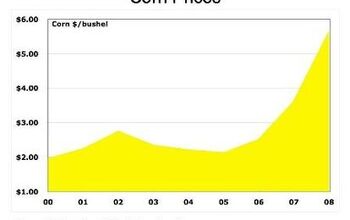E85 Boondoggle of the Day: GM Buys Into Ethanol Start-Up
How anyone convinced GM CEO Rick Wagoner to invest in an experimental process to turn crop wastes, wood chips, scrap plastic, rubber and garbage into ethanol is a mystery shrouded in corporate secrecy. Fortunately for GM PR, the New York Times somehow managed to find an expert willing to give Wagoner's mob props for picking some cash out of the fire to spend on Coskata: an unproven company with an unproven process attempting to service an unproven market. "Lee Schipper, a visiting scholar at the transportation center of the University of California, Berkeley, said that a new method to make ethanol 'presents them with a way of wiggling the industry out of fuel economy standards.'" Yes, OK, but why buy a high tech firm that's only been in biz since 2006, and isn't even considered an industry leader? Or, for that, matter why spend precious R&D dollars on ANY E85 company? Why not just build the vehicles that burn the stuff? Lest we forget, Wagoner can't even convince Wal-Mart to offer E85 pumps, never mind find a new way to produce the fuel. Well, they say con men are easy targets…
More by Robert Farago


































Comments
Join the conversation
The Coskata process, if it works, is a big step forward from corn ethanol, so it may be worth a try. Also, interestingly, Toyota is getting into cellulosic ethanol. Is Toyota going to use its pile of money to compete with Big Oil?
Zenith: Not to mention the fact that you also get compost out of composting (duh), which can be used to provide nutrients to soil that has been laid waste to buy overfarming. There are quite a number of methane recovery operations out here in California, mostly dairies, with some sewage treatement plants also capturing the methane and using it to operate turbines that meet the electric needs of the treatment plant. I totally agree that the use of methane produced by composting should lead to a more direct and efficient source of energy than the production of ethanol from waste.
If you can't get Congress to directly subsidize YOUR industry, buy into one they DO subsidize! Wagoner's a genius!